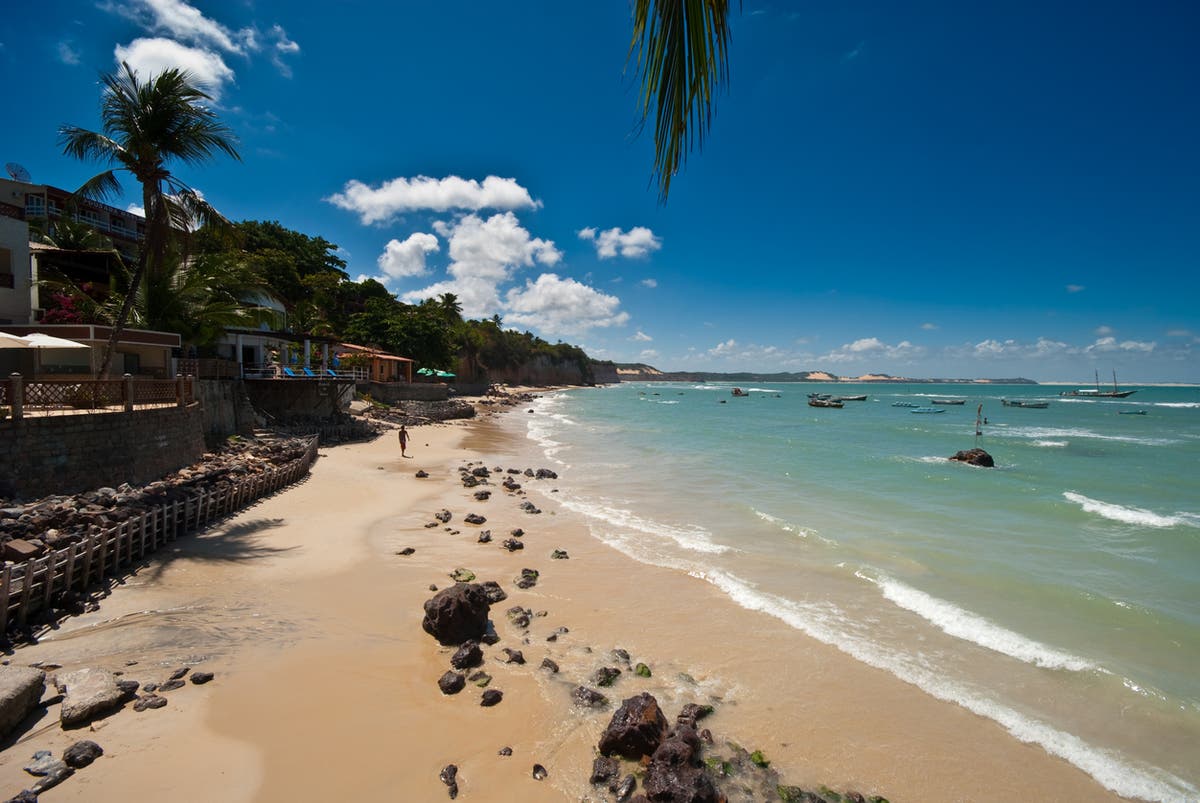- PolyPassport
- Posts
- Donald Trump: a British citizen and um...a flight risk?
Donald Trump: a British citizen and um...a flight risk?
Could the former president flee justice?
Welcome to the inaugural edition of PolyPassport – your home for all things multiple citizenship, global mobility, and the cross-border economy. We’re glad you’re here.

On the agenda this week:
Donald Trump. The former U.S. president is in legal hot water. We examine a hypothetical: could Trump pick up a British passport and flee justice?
Thailand woos digital nomads. A whopping 10-year remote worker visa is in the works. It’s a big deal.
A sigh of relief in Vietnam. After a brief suspension, Germany and other countries resume stamping visas in Vietnamese passports.
Thought experiment: is Donald Trump a British citizen and um…a flight risk?
Here’s a completely imaginary scene that’s not too far removed from reality.
Facing a thicket of legal inquiries, former U.S. president Donald J. Trump huddles with a small army of legal advisors somewhere at his sprawling Mar-a-Lago compound. His cell phone buzzes, showing a text message from a loyal foot soldier in law enforcement. It’s a warning—and it doesn’t mince words.
“FBI moving to arrest you in 12 hours. Get to safety.”

Official White House Photo by Shealah Craighead
Trump hastily adjourns the meeting and gets up from his chair. The lawyers disperse. He motions at a nearby aide and tells her to ready the plane. “London’s calling,” the ex-Commander-in-chief says. Trump lumbers over to his desk and grabs the essentials he’s had on hand for months: a go bag, a burner phone, and a shiny blue passport from the United Kingdom.
Hypothetical, but possible.
There’s much ado about the recent seizure of Trump’s passports during the FBI raid on Mar-a-Lago. But few are asking what other passports the real estate tycoon could obtain, and whether he could or would settle somewhere abroad without fear of being extradited—in Great Britain, for example, where his roots run deep and his business interests are expansive.
To be sure, PolyPassport isn’t encouraging anyone, much less Trump, to skip town. Nor are we saying he could get away with it. But what we can say unequivocally is the leading figure of the Republican party could legally become a subject of the British Crown on the basis of ancestry. And the jury is still out whether the Brits would have legal or political cause to fulfill an extradition request from Washington.

Caspar Rae/Unsplash
Trump’s mother, Mary Anne Trump (née MacLeod), was born on Scotland’s Isle of Lewis in 1912. She lived in Scotland—part of the United Kingdom since 1707—until she emigrated to the United States in 1930.
Section 4C of the British Nationality Act 1981 makes plain that any child born overseas to a British mother can apply to register as a UK citizen.
It wasn’t always like this. The London-based OTS law firm explains that until the law was amended in 1981, only children born to British fathers had this right. Additionally, in 2019, authorities did away with a provision stipulating registrants had to satisfy a “good character” test. PolyPassport will leave it up to readers to decide if Mr. Trump would have passed muster under the old rule.
In other words, as it’s written today, the Nationality Act clears the way for Trump to acquire a British passport. That much we know.
Now comes the intriguing bit. Could the former occupant of the White House—in our hypothetical scenario, a dual U.S.-U.K. citizen—also elude criminal proceedings in the United States? The law leaves more questions than answers.
Ratified in 2007, the extradition treaty between the United States and United Kingdom lays out the conditions compelling either country to deliver a fugitive from justice. In general, criminal acts are extraditable when punishable in both countries by imprisonment of a year or longer.
If Trump is convicted of the Espionage Act—just one of the laws authorities suspect he has violated—one expert says he could face a prison sentence of ten years. In the United Kingdom, an equivalent statute is pending reform that could lead to jail time of 14 years.
In theory, on this count alone, Trump might face extradition from the United Kingdom. But the wrinkle is Article 4 of the treaty, which explicitly forbids extradition over “political offenses.”
This gets to the heart of the debate in the United States. Ask the FBI and U.S. Attorney General Merrick Garland and they’ll tell you Trump’s legal woes are precisely that—legal consequences for criminal acts. But to Trump and many of his lieutenants in the GOP, the raid is nothing short of a political witch hunt.

Photo credit: Robert Klank/Unsplash
The British government would be in an impossible situation. Do they risk crossing a Democratic White House by rejecting an extradition request, pointing to Article 4? Or do they acquiesce and burn a bridge to the most influential member of a political party poised to regain power in the midterm elections—and possibly the White House in 2024?
The stakes would be high. Since Brexit, successive U.K. prime ministers have staked their political fortunes on a sweeping trade deal with the United States that is still under negotiation. Wider diplomatic, security, commercial, and cultural ties could hang in the balance under a resentful President Trump or his designated successor.
The landscape isn’t likely to change soon. Liz Truss, widely believed to be the next resident of 10 Downing Street, is styling herself the heiress apparent to the legacy of “Iron Lady” Margaret Thatcher, the conservative former prime minister who famously maintained a close friendship with another former Republican president, Ronald Reagan.
Making matters more complicated still, Trump would be a British citizen with deep-seated business interests up and down the country. His multimillion-dollar golf properties are generating jobs and tax revenue. His base of support in the country, while not overwhelming, is vocal and led by influential figures like Brexiteer Nigel Farage.
We’re neither psychics nor legal scholars. But if this hypothetical scenario came to pass, we predict the Brits would have no choice but to slow-roll an extradition request and try to have it both ways. But on the question of Trump’s citizenship, no crystal ball is necessary. He may have lost his U.S. passports to the FBI, but a British one is well within reach if he wants it.
Thailand ups the ante with a new 10-year digital nomad visa

Photo credit: Robin Noguier/Unsplash
Starting September, Thailand will offer a 10-year visa to eligible remote workers. Blue-collar workers need not apply – the program is largely aimed at highly skilled and handsomely compensated people employed in tech and tech-related industries. If you’ve made at least $80,000 a year for the last two years and work for a company that rakes in $150 million or more year after year, read on.
It's easily one of the most generous digital nomad visa programs in the world, exceeding other digital nomad visa mainstays—Croatia and Bermuda, for instance—by nine years.
Even better: under the program in Thailand, income tax will be capped at 17% as opposed to the usual 35%.
You’re eligible to apply if you meet one of the five criteria below, courtesy of Mashable:
1. You’re independently wealthy, holding over $1 million in assets.
2. You’re a pensioner with a stable income.
3. You work remotely for a well established company based overseas.
4. You’re a highly skilled professional employed by a Thai company or organization.
5. You’re the spouse or child of a Thai visa holder.
Vietnam passport holders finally get visa relief

Photo credit: Jack Goren/Unsplash
Vietnamese passport holders worldwide are breathing a sigh of relief. Authorities in Germany and other EU countries have reversed a decision to deny short and long-term visas to holders of a newly updated blue-cover Vietnamese passport that did not list the bearer’s birthplace. There are over 103,000 Vietnamese citizens living in Germany, according to estimates.
Finland, the Czech Republic, and Spain had also suspended visa processing for Vietnamese citizens. Germany said it was difficult to verify their identity without a place of birth.
Other headlines
Chatter
🌍🌍35% of countries in Africa include a special 𝒊𝒖𝒔 𝒔𝒐𝒍𝒊 provision for children born on their territory who would otherwise be stateless.
🪪Do you know what 𝒊𝒖𝒔 𝒔𝒐𝒍𝒊 means?
💡Find the answer on the Portal: bit.ly/Portal-citizen…
— IOM GMDAC (@IOM_GMDAC)
10:31 AM • Aug 17, 2022
Yeah but how GOOD is the new Belgian passport?
#tintin#captainhaddock#snowy
— According to McGee (@according2mcgee)
8:54 AM • Aug 19, 2022
So Colombia has a digital nomad visa available soon.
Can stay in country for 2 years.
They're on Central time zone.
Anyone with a remote job wanna come hang out with me in the tropics?
Cost of living and requirements:
— Tinker 🔆 (@TinkerSec)
4:06 PM • Aug 18, 2022
Quote of the week
One of my friends from Japan summed it up well. She explained that many people in Japan have a driver’s license but don’t actually drive – they call that being a “paper driver”. She said that I was a “paper American.”


.png/jcr:content/Supreme-Court-facade_CNNPH%20(5).png)



